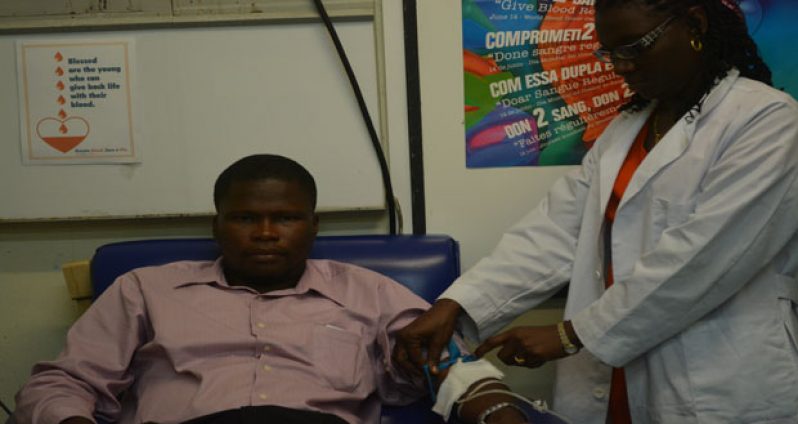IN 2014, Grenada received blood donations from 1362 persons, of which 519 gave voluntarily and regularly. According to Blood Procurement Officer of the Blood Lab, Keren Jolly, the department is currently correlating data to ascertain the frequency of voluntary donations.
During a recent interview, she disclosed that her department has joined forces with the Pan American Health Organization (PAHO) to achieve a 100 per cent voluntary donations.
In pointing out that safety of blood through full screening and testing for recognised infectious agents remains a primary objective of the lab, Jolly stressed that the voluntary donor drive was aimed at securing the 100 score card, given that 70 per cent of the Health Ministry’s recorded figures for 2014 were replacement donors.
Jolly explained that voluntary donors are largely self-motivated, while replacement donors continue to pose a challenge although they are aware that their donations are for a family member or a friend. “This is the major challenge that we are faced with and are trying to better educate and convince persons about the importance of giving blood,” the Blood Procurement Officer said. She stressed that the primary goal of the lab this year is a departure from family replacement (when family members pay for blood) to voluntary donations, because blood is essentially the body’s transportation system. “As blood circulates, it delivers oxygen and nutrients throughout the body. It also collects waste products and carries them to the organs responsible for making sure the waste leaves the body,” the Blood Procurement Officer stated.
Jolly added that while the bank services the three main hospitals along with another, St Augustine, there are no other centres. “There have been quite a few persons who have expressed the desire to see more centres, but currently we only have one which services all three islands,” she concluded.
Meanwhile, Director of Lab at the Hospital, Roderick Gabriel, noted that blood donations are divided into groups based on who will receive the collected blood. An ‘allogeneic’ (also called “homologous”) donation is when a donor gives blood for storage at the blood bank for transfusion to an unknown recipient. A “directed” donation is when a person, often a family member, donates blood for transfusion to a specific individual. Directed donations are relatively rare when an established supply exists. A “replacement donor” donation is a hybrid of the two and is common in developing countries. “In this case, a friend or family member of the recipient donates blood to replace the stored blood used in a transfusion, ensuring consistent supply,” Gabriel added.
SOME FACTS ABOUT BLOOD TYPES, TRANSFUSION AND DONATION
A blood type (also called a blood group) is a classification of blood based on the presence or absence of inherited antigenic substances on the surface of red blood cells. These antigens may be proteins, carbohydrates, glycoproteins, or glycolipids, depending on the blood group.
A total of 32 human blood group systems are now recognised by the International Society of Blood Transfusion. The two most important ones are ABO and the RhD antigens; they determine someone’s blood type (A, B, AB, and O, with + and – denoting RhD status).
Blood transfusion is a simple medical procedure during which a patient receives whole blood or one of its parts through an intravenous line or IV. A nurse will begin an IV. After the needle is inserted into an arm or hand, a tiny plastic tube is left in the vein and is attached to the IV tubing, which is then used to connect to the bag containing the blood. The blood bag is hung upside down from an IV pump that controls the speed of the flow.
It was pointed out that the shelf life of whole blood is 35 days; blast-frozen plasma can last up to one year, platelets can last up to five days. (However, many patients need only one part of the blood and not the whole blood.)
There are also several health benefits associated with being a blood donor. These include:
1.Free health checkups: Before every blood donation process, a series of health check-ups are performed on the donor free of cost.
2.Reduced risk of heart disease: Regular blood donation helps to keep the levels of iron in the body in check, especially in males; this has been shown to reduce heart disease.
3.Burns calories: One-time blood donation helps you shed 650 Kcal. This can aid you in your body weight control measures.
4.Reduces the risk of cancer: High levels of iron have been implicated in cancer. Theoretically, donating blood frequently will reduce the risk of cancers.
Persons who are interested in becoming donors are encouraged to visit the lab located at the back of the Grenada General Hospital in Grand Etang Road St. Georges.
By Rawle Nelson




.png)









